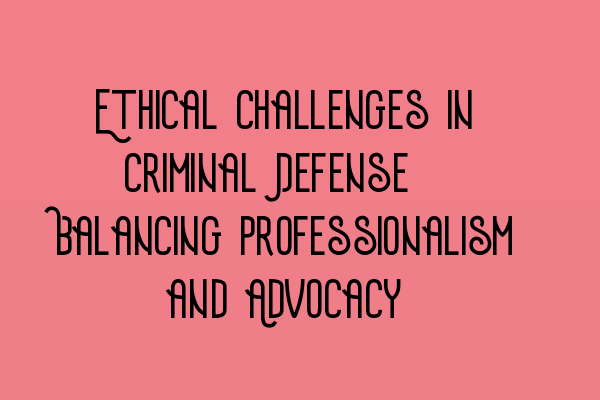Ethical Challenges in Criminal Defense: Balancing Professionalism and Advocacy
As criminal defense solicitors, we are tasked with the challenging and honorable duty of zealously advocating for our clients’ rights while remaining ethically grounded. The nature of our profession requires us to balance professionalism and advocacy, navigating the ethical challenges that arise in the practice of criminal law. In this blog post, we explore some of the key ethical considerations faced by criminal defense solicitors and strategies for finding the right balance.
The Duty of Advocacy
The primary role of a criminal defense solicitor is to advocate for their client’s best interests. It is essential to ensure that the accused receives a fair trial and that their constitutional rights are protected. This duty of advocacy demands a rigorous defense, irrespective of the client’s guilt or innocence.
However, the duty of advocacy must be weighed against the solicitor’s ethical obligations. We must not engage in dishonesty, deception, or any form of unethical practices for the sake of winning a case. Upholding the principles of integrity and honesty is paramount to maintaining trust in the legal profession and the criminal justice system as a whole.
Conflicts of Interest
Another ethical challenge that frequently arises in criminal defense practice is navigating conflicts of interest. Solicitors must identify and address any potential conflicts early on, assuring that their obligations to the client are not compromised.
Conflicts of interest can arise when the solicitor has a personal or professional relationship with parties involved in the case or when multiple clients have competing interests. In such situations, it is crucial to consult the Solicitors Regulation Authority (SRA) guidelines and, if necessary, seek independent legal advice to navigate through the ethical complexities.
Confidentiality and Attorney-Client Privilege
Confidentiality and attorney-client privilege are fundamental principles in the legal profession that help build trust and ensure open communication between solicitors and their clients. Solicitors must maintain the confidentiality of their clients’ information, even if it may be damaging to their own case.
However, the duty of confidentiality must also be balanced against our duties to prevent harm and uphold the rule of law. In certain circumstances, such as when there is a risk of physical harm or the prevention of a serious crime, solicitors may be required to breach confidentiality. It is essential to understand the limits of attorney-client privilege and its exceptions in order to navigate this ethical challenge effectively.
Professional Responsibility and Accountability
Professional responsibility and accountability go hand in hand with ethical practice. Solicitors must always strive to maintain their professional integrity and conduct themselves in a manner that upholds the reputation of the legal profession.
One way to ensure accountability is through continuing professional development and staying up to date with the latest legal developments. This includes attending courses and workshops such as the SQE 1 Preparation Courses and SQE 2 Preparation Courses, which provide valuable knowledge and insights to enhance your skills as a criminal defense solicitor.
Additionally, solicitors must also be aware of the ethical obligations imposed by the SRA. It is crucial to regularly review the SRA Code of Conduct and keep abreast of any changes or updates to ensure compliance and ethical practice.
Conclusion
As criminal defense solicitors, we face numerous ethical challenges in our pursuit of justice and advocacy. Balancing professionalism, zealous advocacy, and ethical responsibilities requires careful consideration and continuous growth.
By being aware of the ethical challenges that arise in the practice of criminal defense, exploring the relevant guidelines, and seeking professional development opportunities, we can navigate these challenges with integrity and ensure the highest standards of professionalism in our work.
For more information on ethical challenges in criminal defense and to enhance your legal knowledge, consider exploring our related articles:
